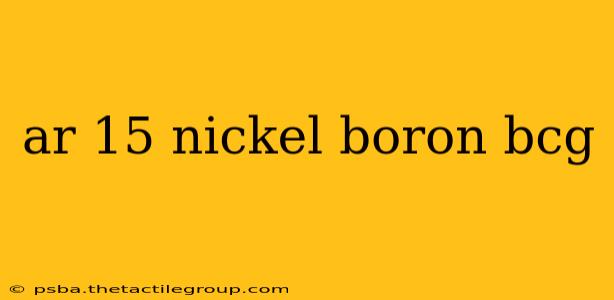The heart of any AR-15 lies within its Bolt Carrier Group (BCG). Choosing the right BCG is crucial for reliability, longevity, and overall performance. Recently, Nickel Boron (NiB) coated BCGs have gained significant popularity among AR-15 owners and enthusiasts. But are they worth the investment? This in-depth analysis explores the benefits, drawbacks, and considerations when choosing a NiB-coated BCG for your AR-15.
What is a Nickel Boron (NiB) BCG?
A Nickel Boron BCG is a standard AR-15 BCG that's undergone a specialized coating process. This process applies a thin layer of nickel boron to the bolt and carrier. This coating isn't just for aesthetics; it significantly impacts the BCG's functionality.
Key Features and Benefits of NiB Coating:
-
Reduced Friction: The NiB coating creates an incredibly smooth surface, dramatically reducing friction between the bolt and carrier. This translates to smoother cycling, reduced wear, and improved reliability, especially in adverse conditions.
-
Enhanced Lubricity: NiB coatings exhibit superior lubricity compared to traditional phosphate coatings. This means the BCG requires less lubrication and remains smoother even when running dry or under extreme conditions like heavy fouling.
-
Corrosion Resistance: Nickel Boron offers excellent corrosion resistance, protecting the BCG from rust and degradation. This is particularly beneficial in humid environments or when the firearm is exposed to the elements.
-
Increased Durability: The hardness of the NiB coating makes the BCG more resistant to wear and tear. This contributes to a longer lifespan and reduces the need for frequent maintenance.
-
Improved Reliability: The combination of reduced friction, enhanced lubricity, and corrosion resistance contributes to improved overall reliability, especially under stressful conditions or with high-round counts.
Nickel Boron BCG vs. Other Coatings: Phosphate vs. Nitride
While NiB is a popular choice, it's important to compare it to other common BCG coatings:
-
Phosphate: Phosphate is a more traditional and less expensive coating. While it offers some corrosion resistance, it's generally less smooth than NiB, leading to increased friction and potential for wear.
-
Nitride: Nitride is another popular coating known for its hardness and corrosion resistance. It offers better lubricity than phosphate but generally falls short of NiB's smoothness and self-lubricating qualities.
Considerations When Choosing a NiB-Coated BCG:
-
Cost: NiB-coated BCGs typically command a higher price than those with phosphate or nitride coatings.
-
Compatibility: Ensure the BCG is compatible with your specific AR-15 platform. Different manufacturers may have slight variations.
-
Reputation of the Manufacturer: Choose a reputable manufacturer with a proven track record of producing high-quality BCGs. Research reviews and user feedback before making a purchase.
Conclusion: Is a Nickel Boron BCG Right for You?
A NiB-coated BCG offers significant advantages in terms of performance, reliability, and longevity. The reduced friction, enhanced lubricity, and superior corrosion resistance make it a worthwhile investment for serious AR-15 users and those operating in challenging environments. However, the higher cost is a factor to consider. Ultimately, the decision of whether a NiB BCG is right for you depends on your individual needs and budget. If reliability and smooth operation are paramount, the investment in a quality NiB-coated BCG is often well justified. Thorough research and careful consideration of your specific requirements will ensure you choose the best BCG for your AR-15.

